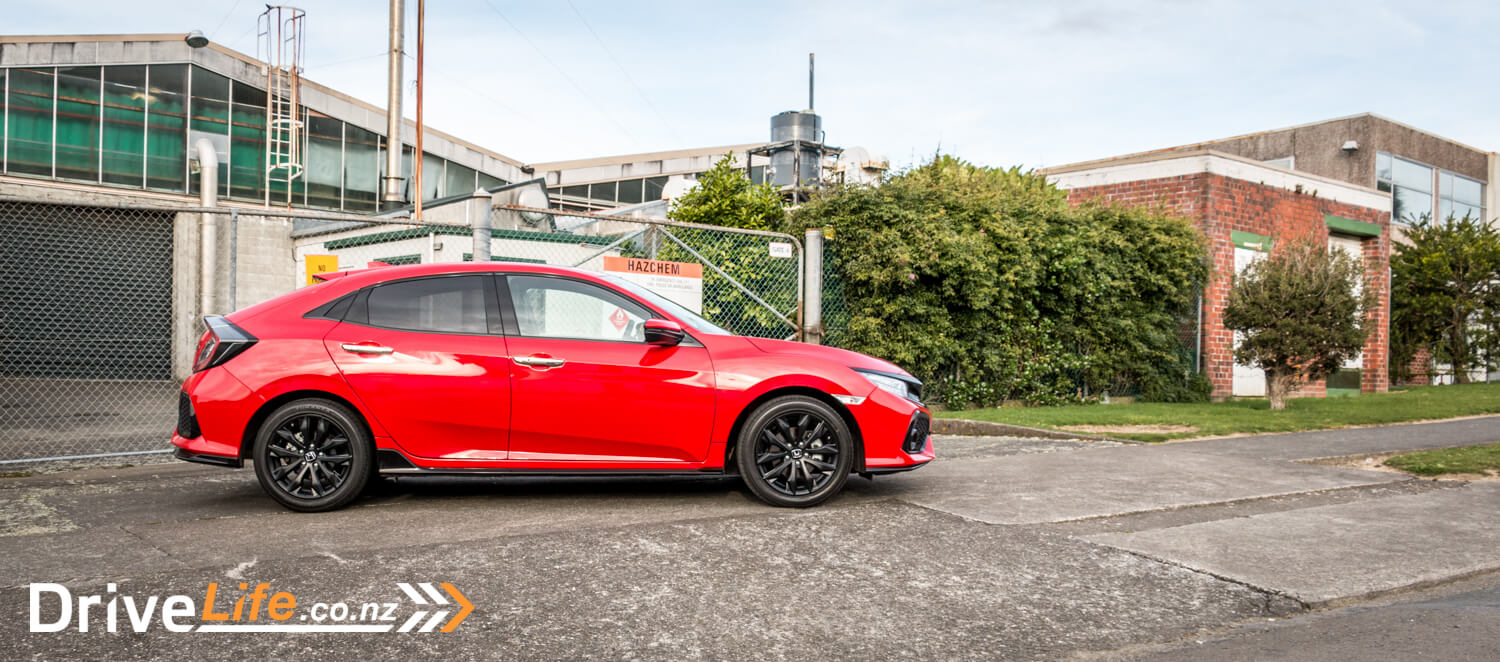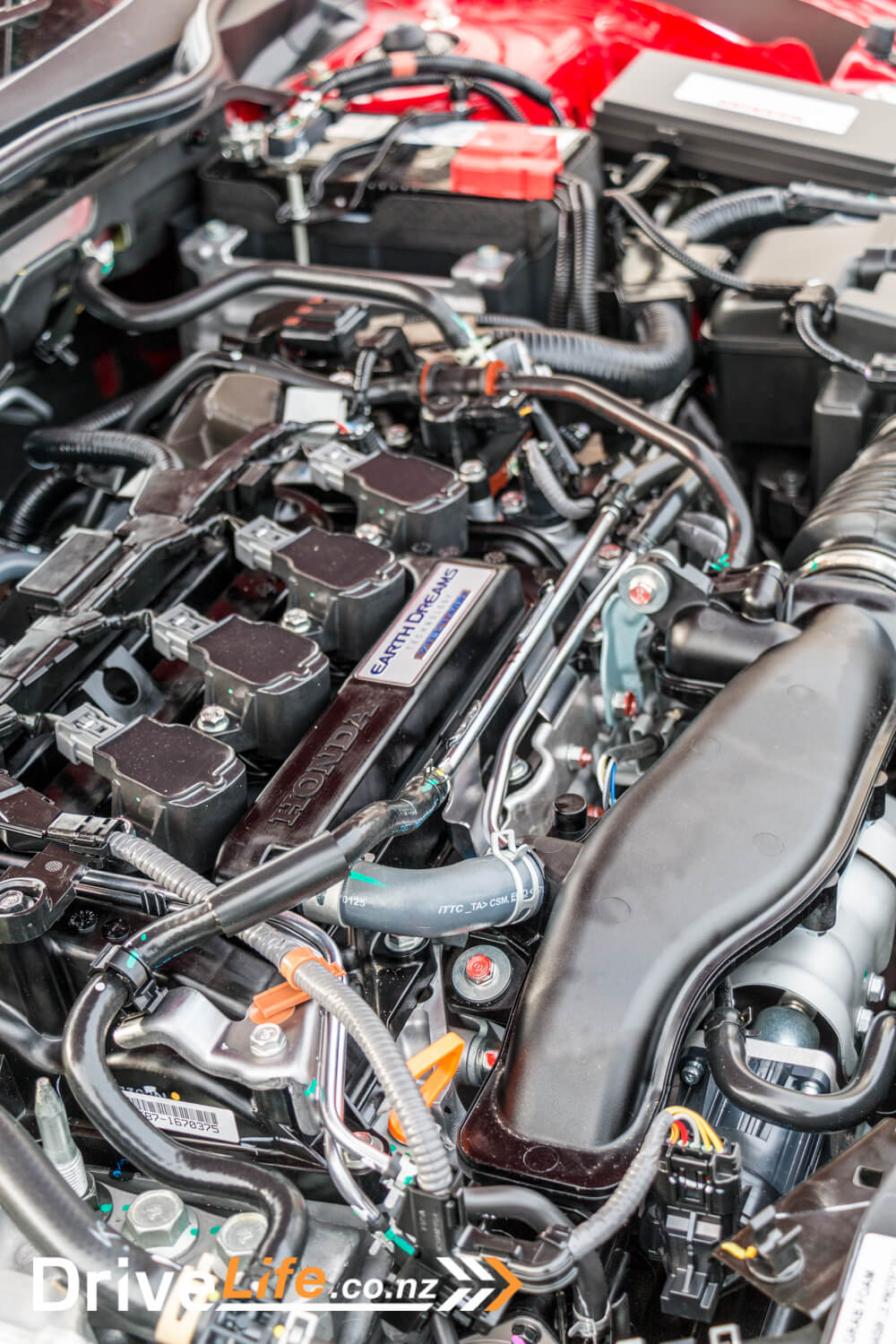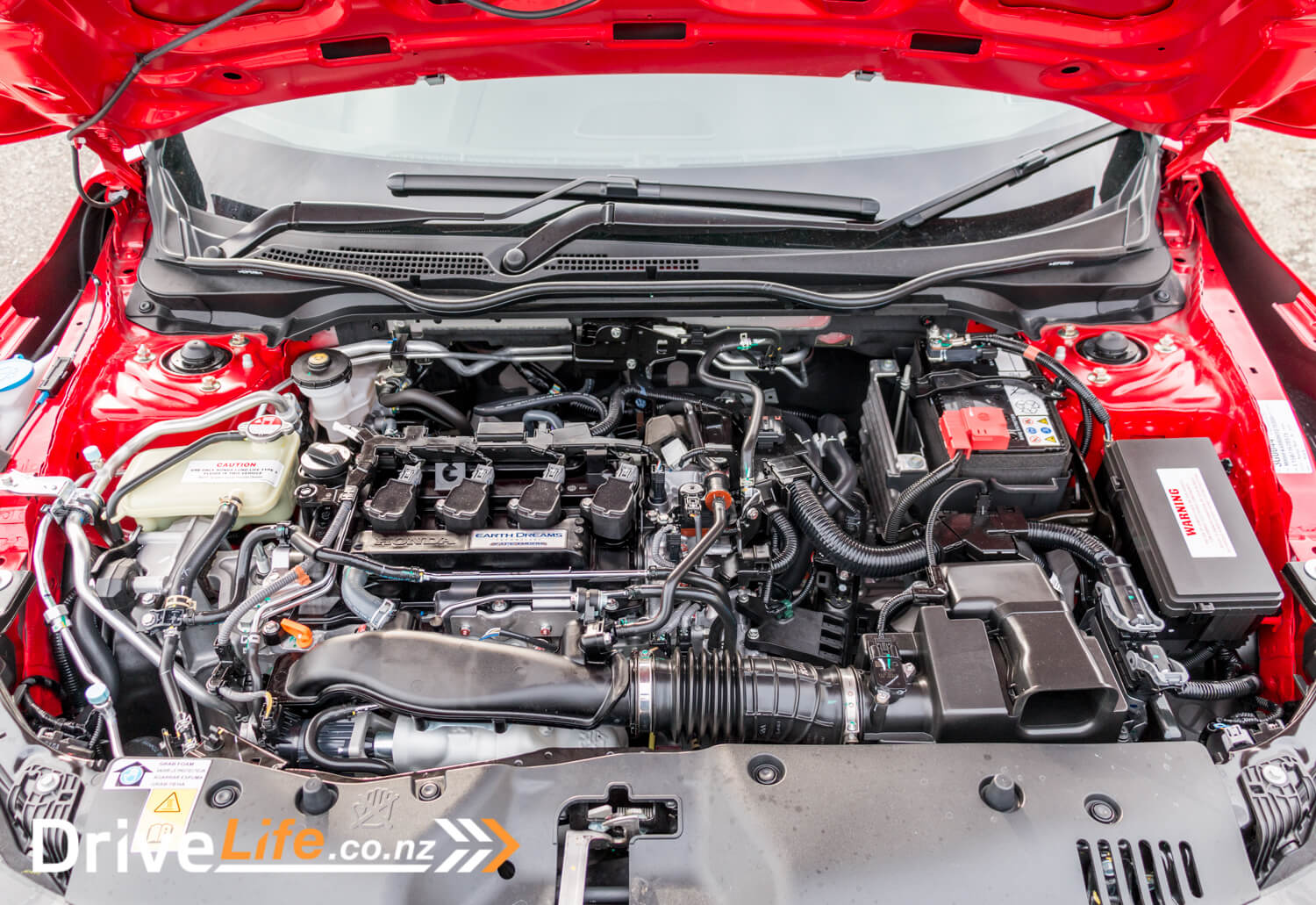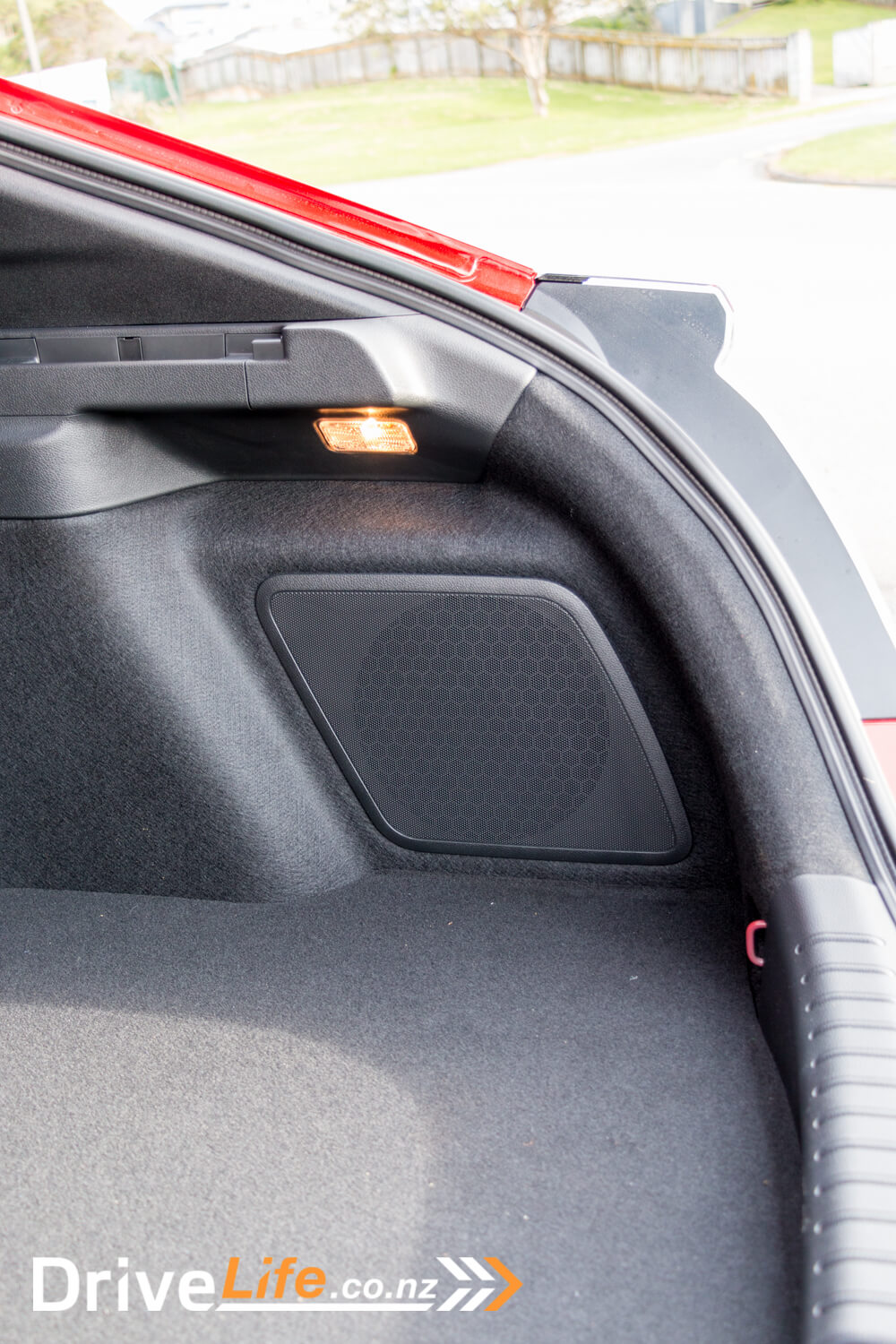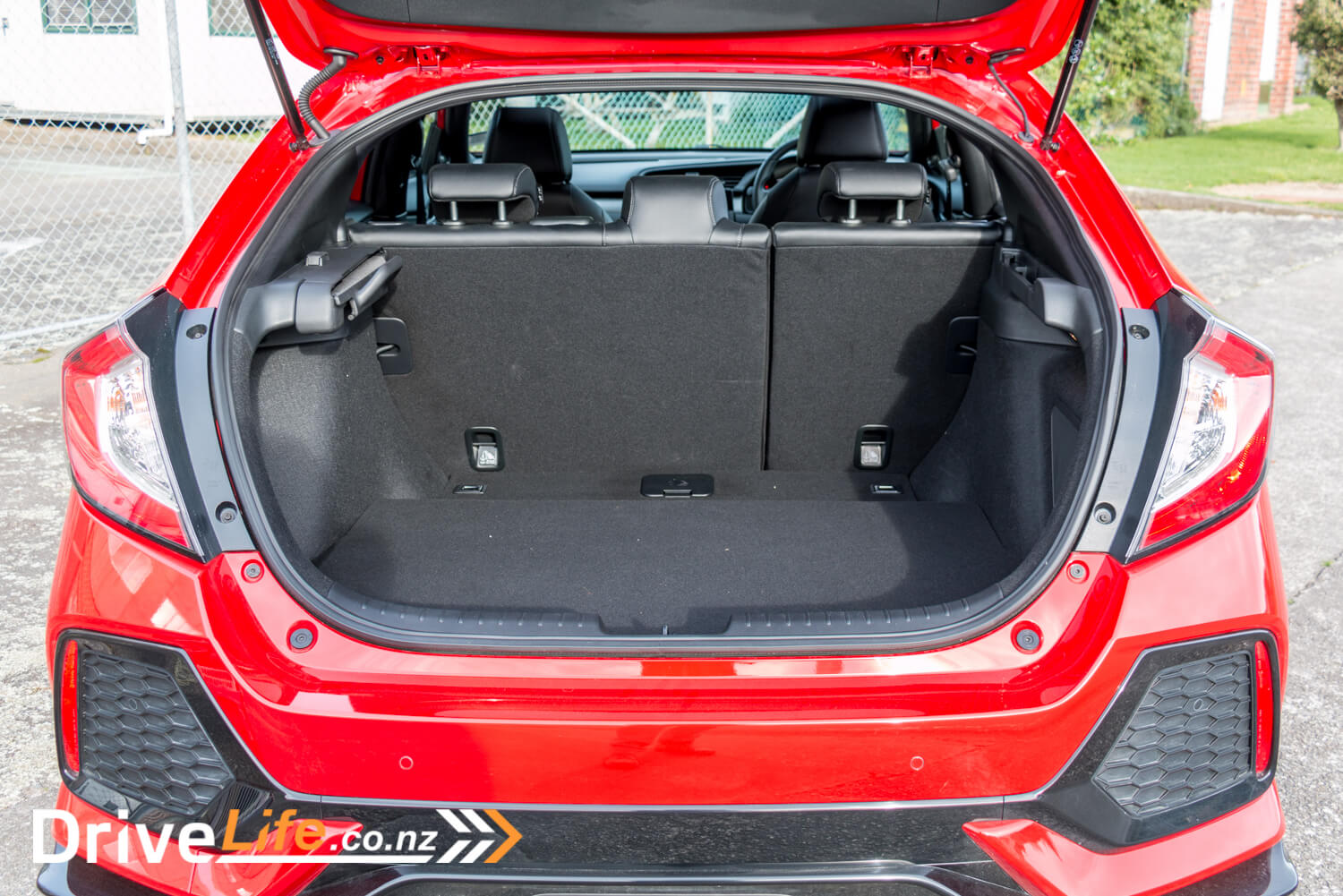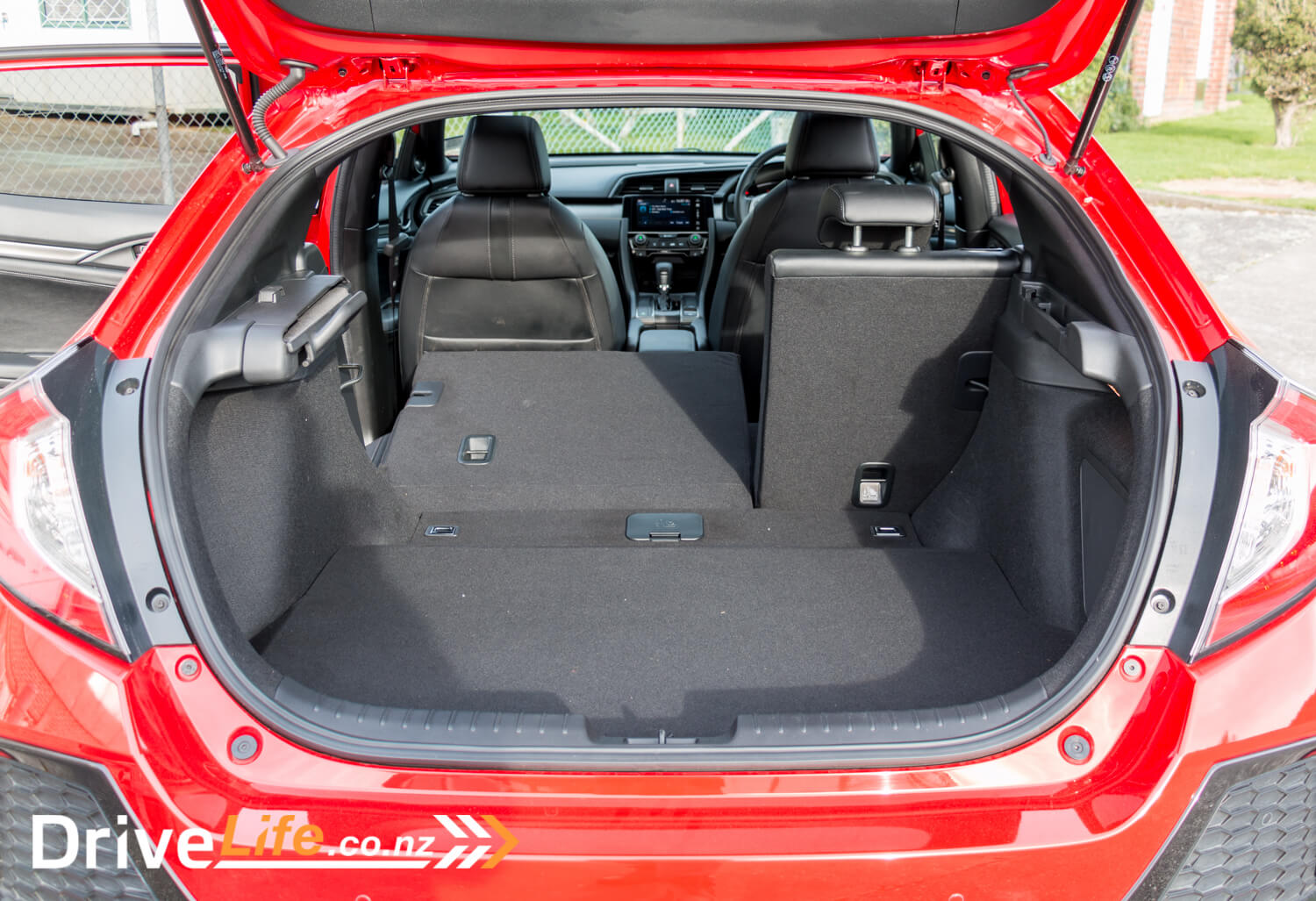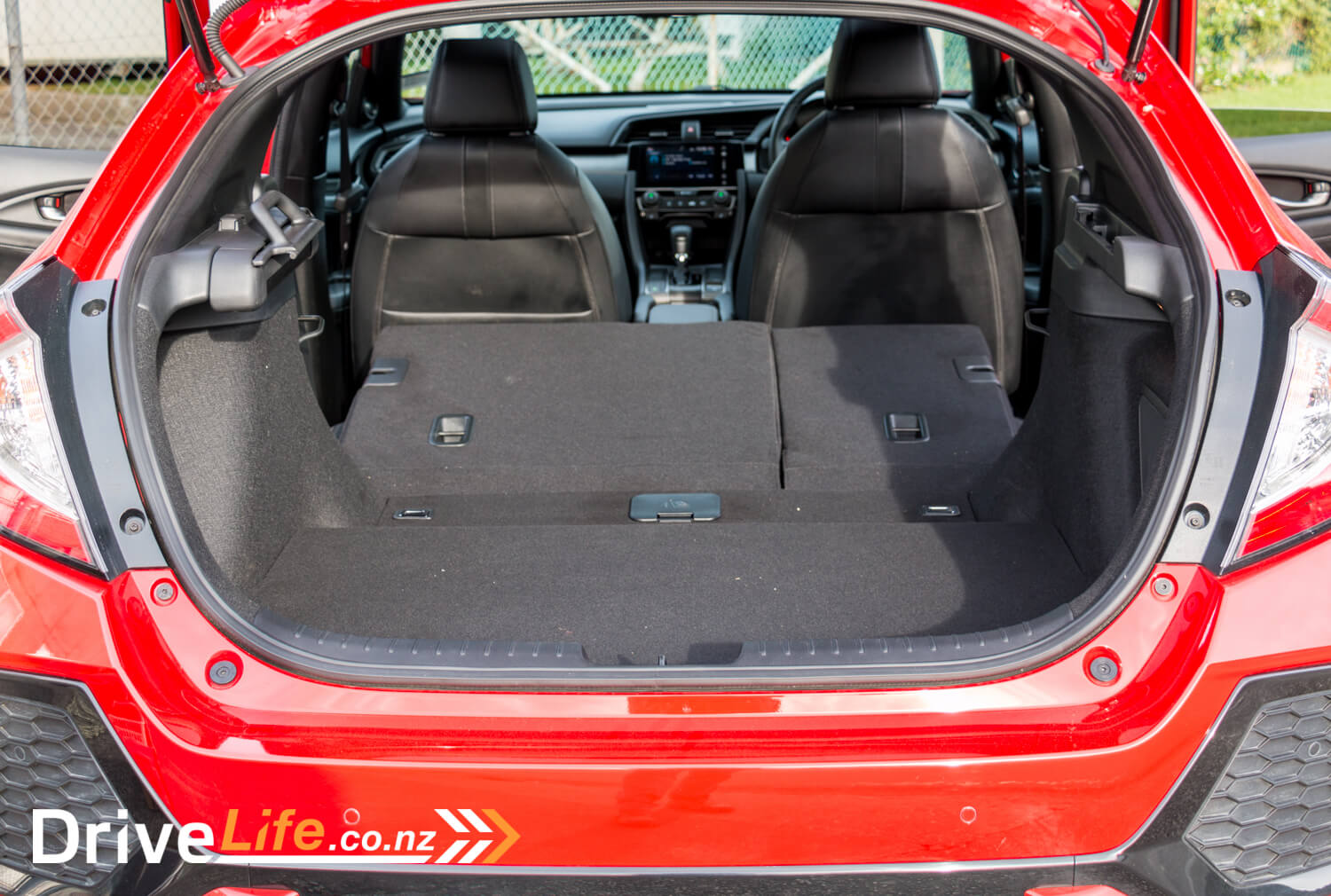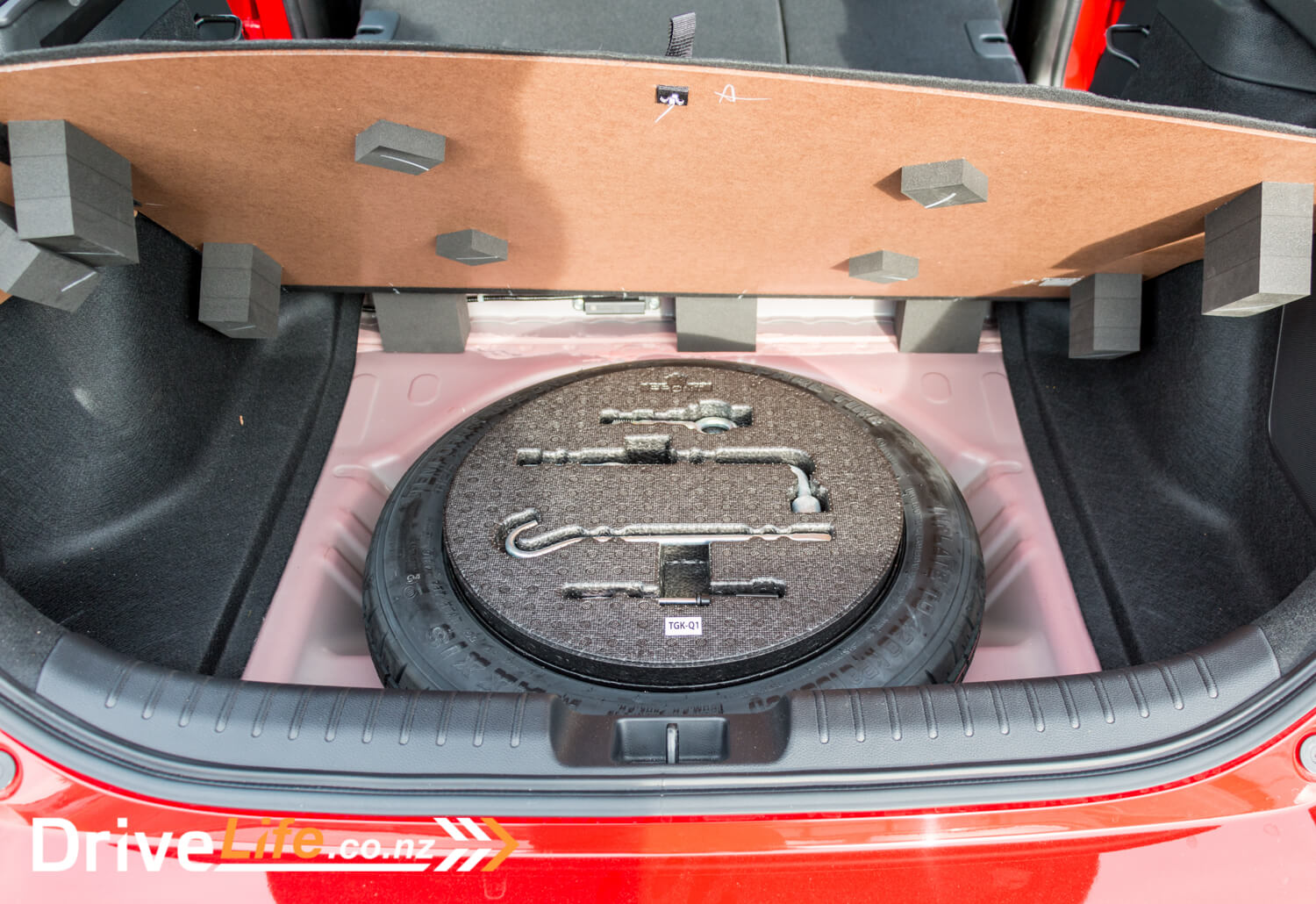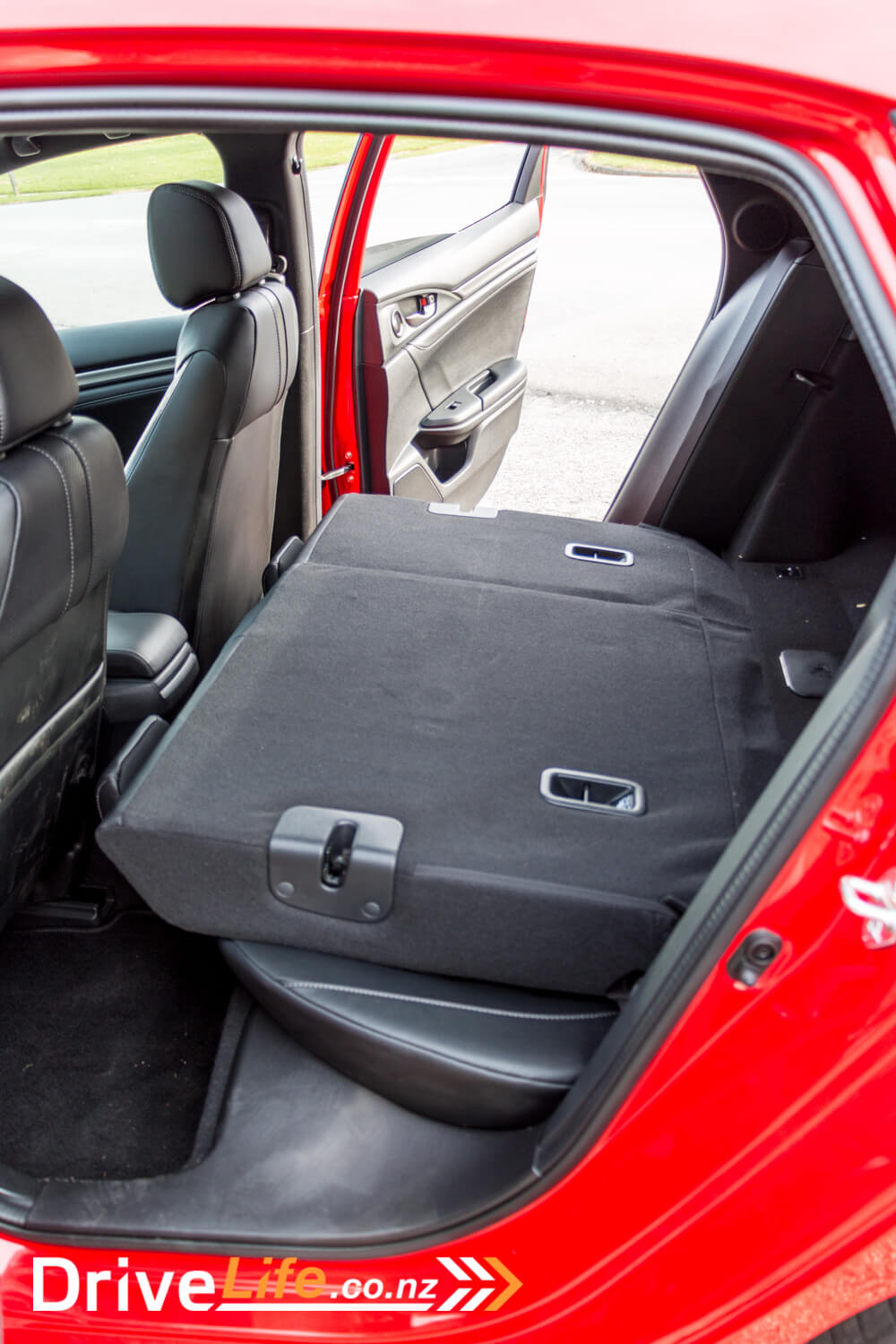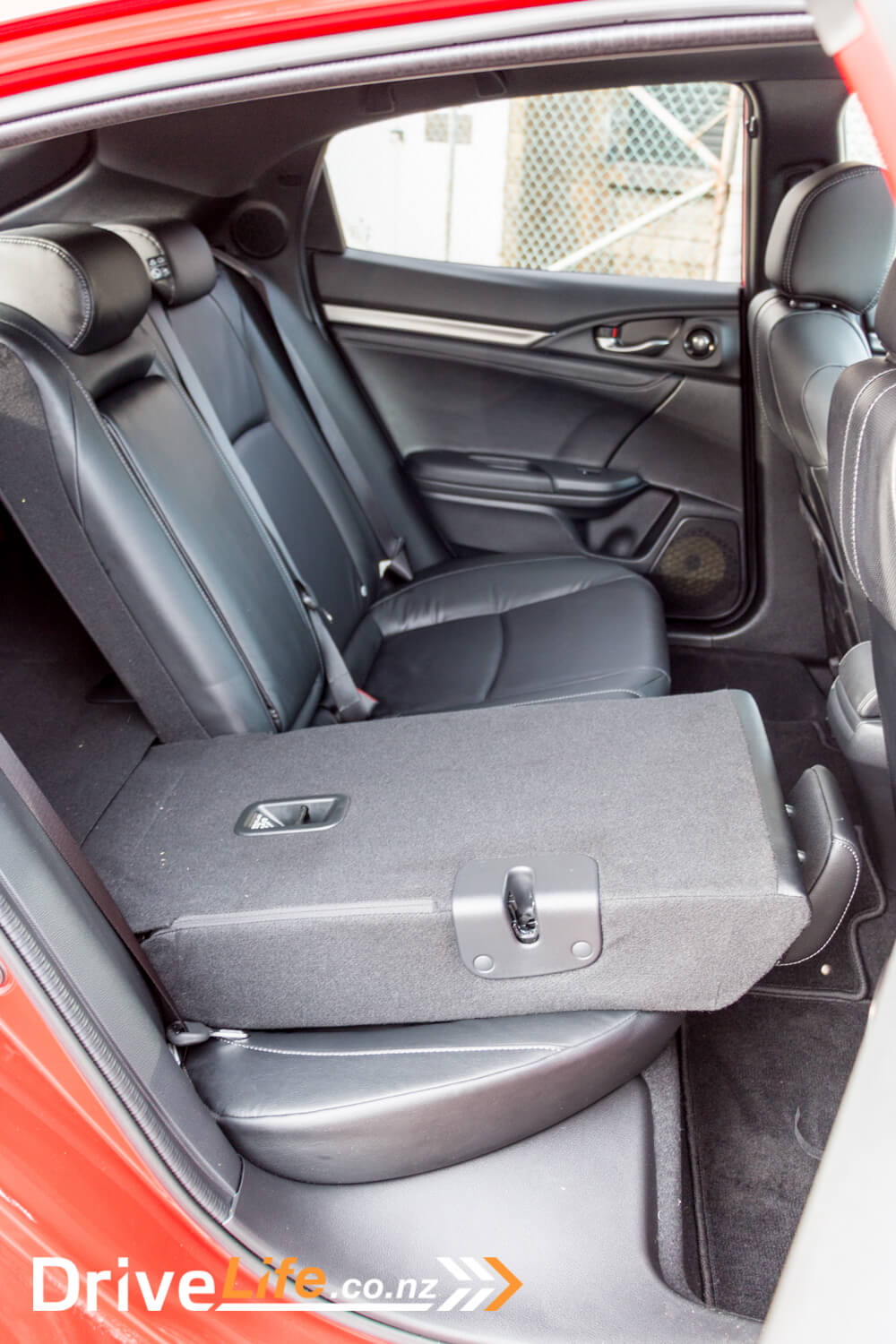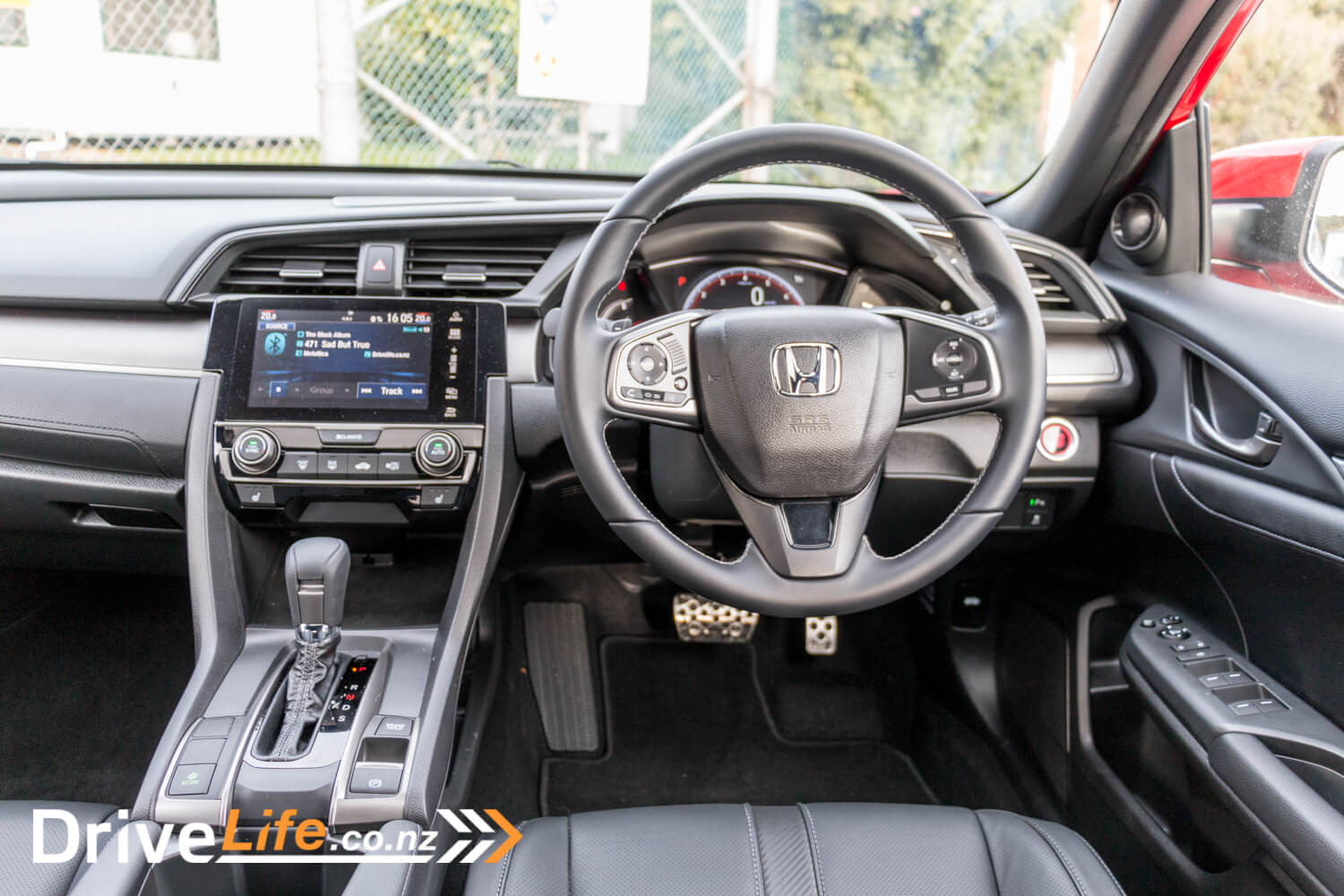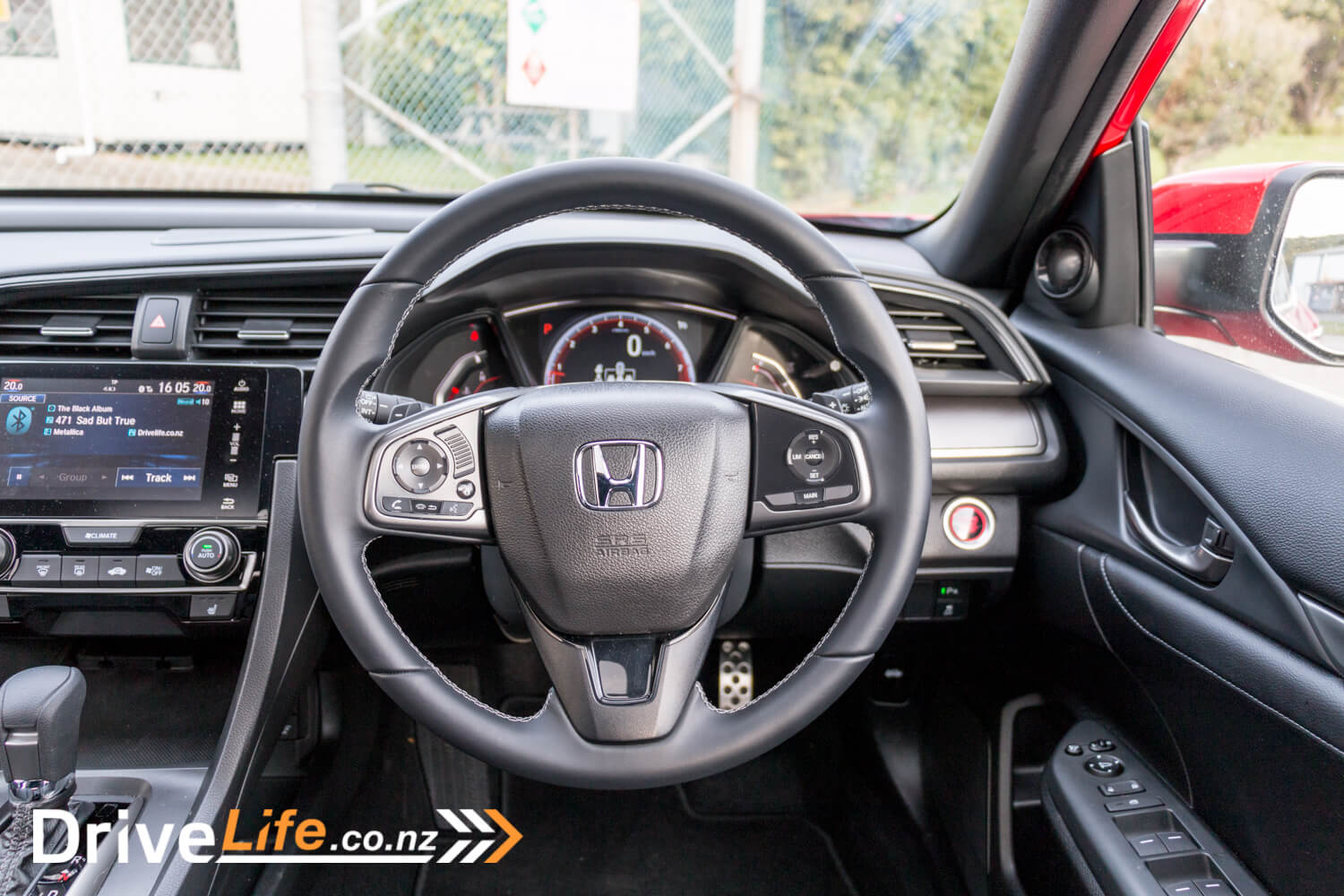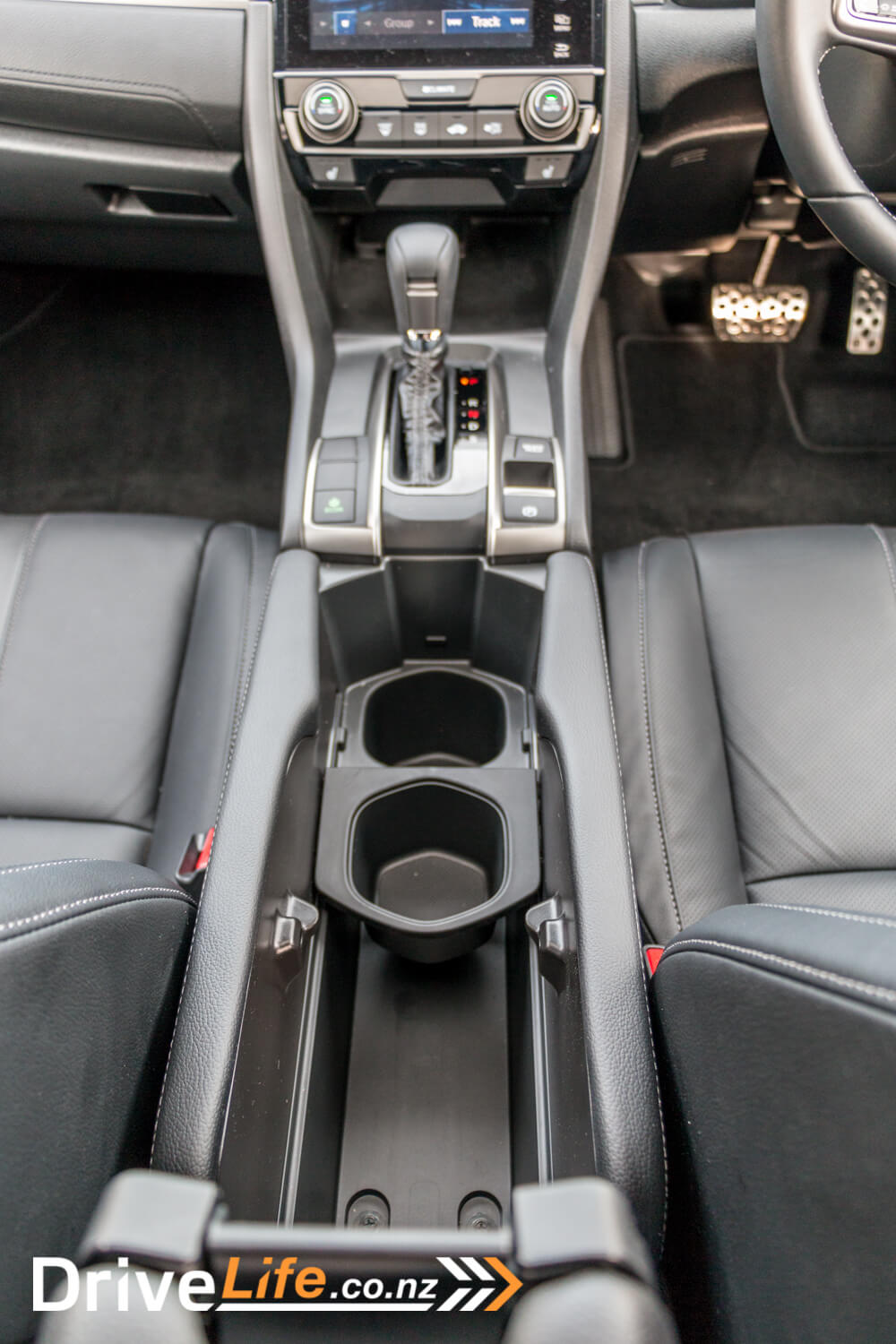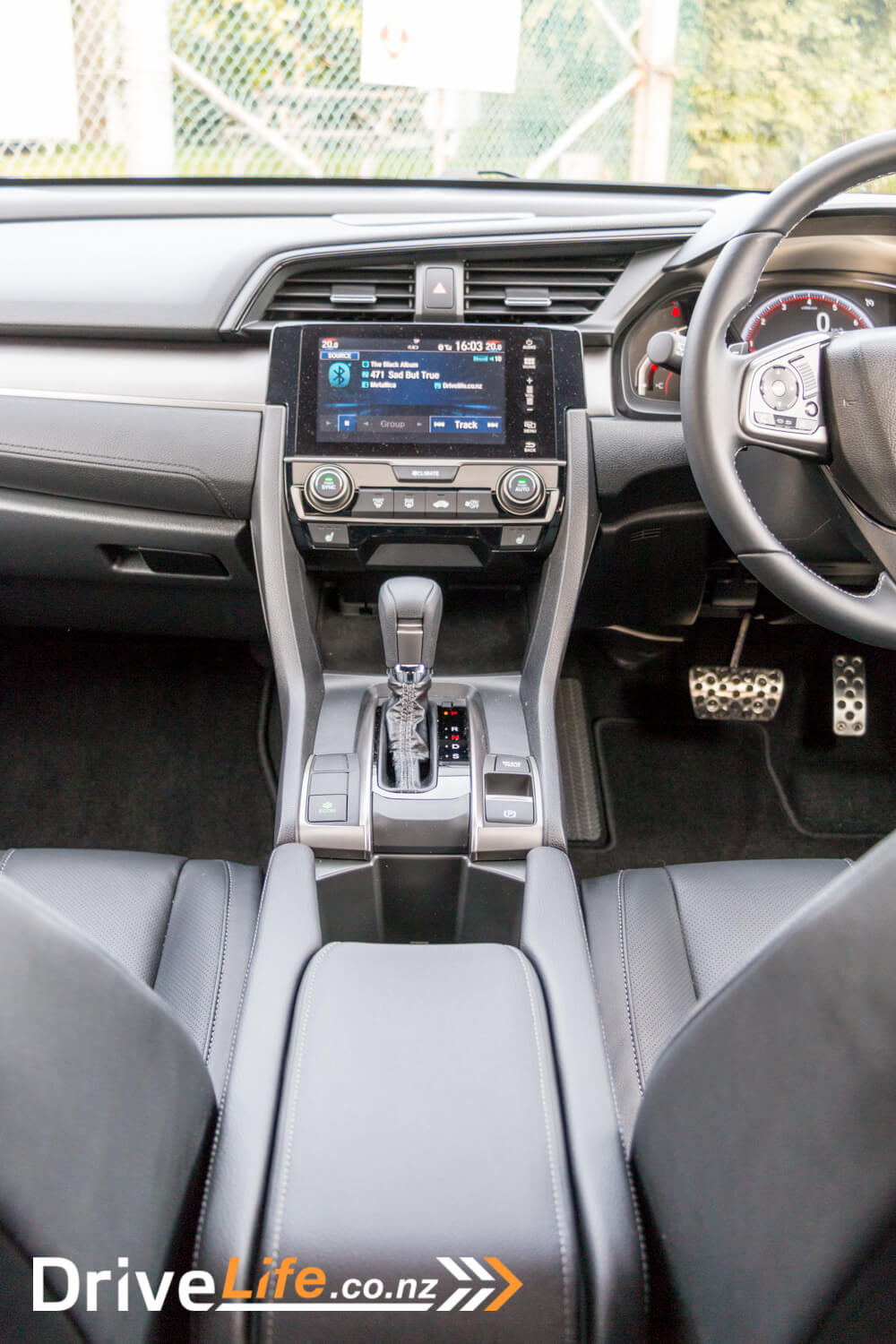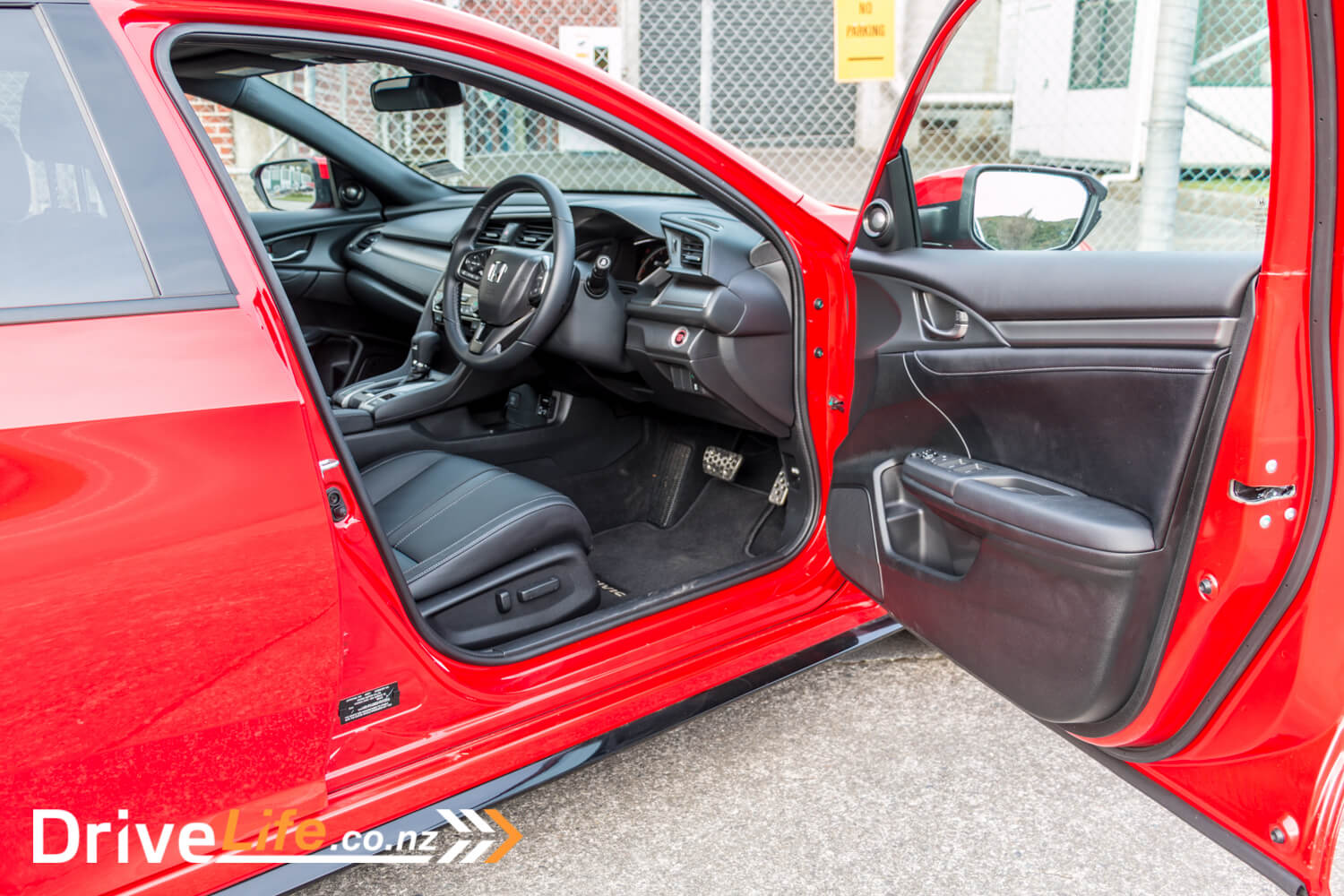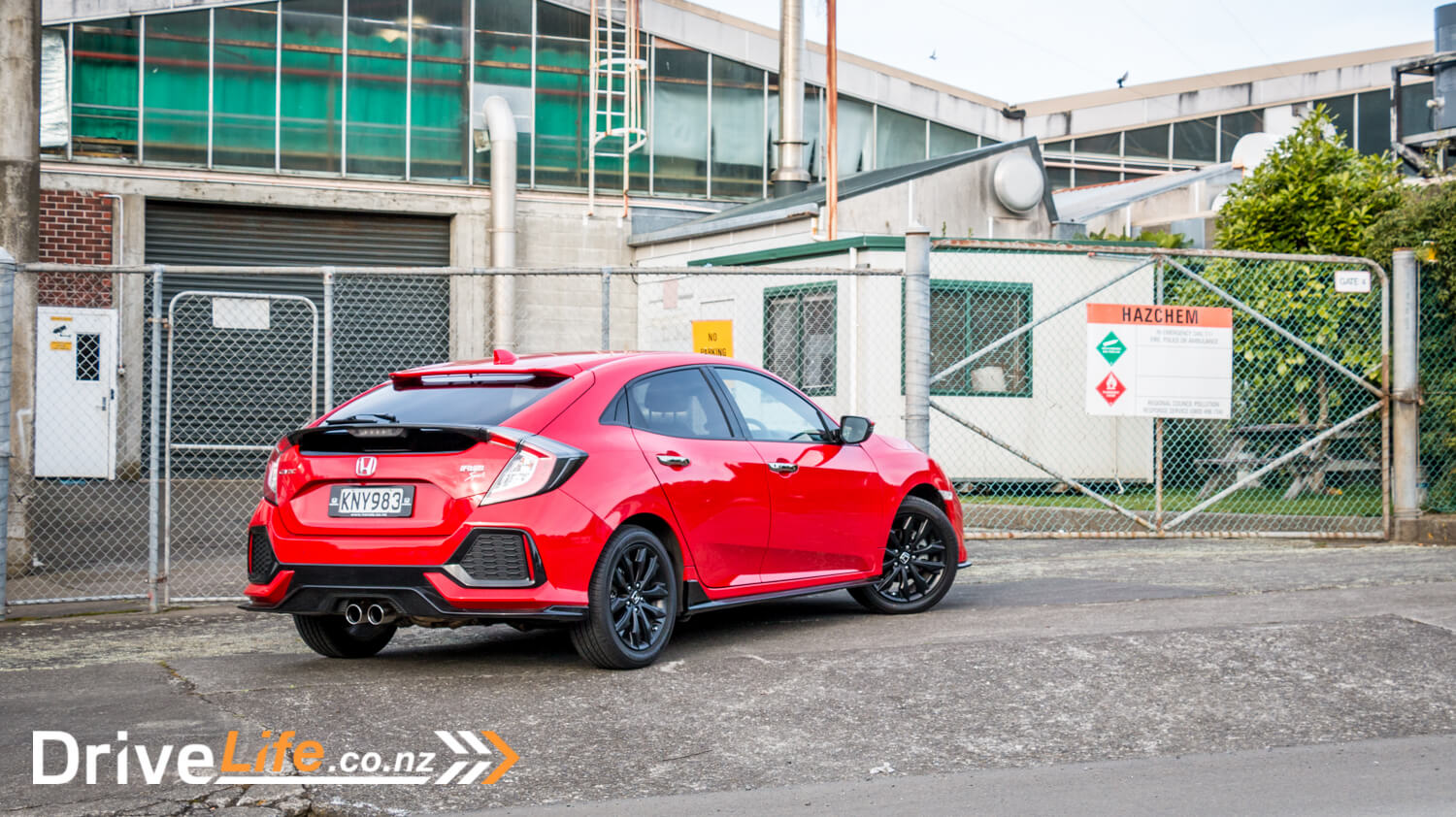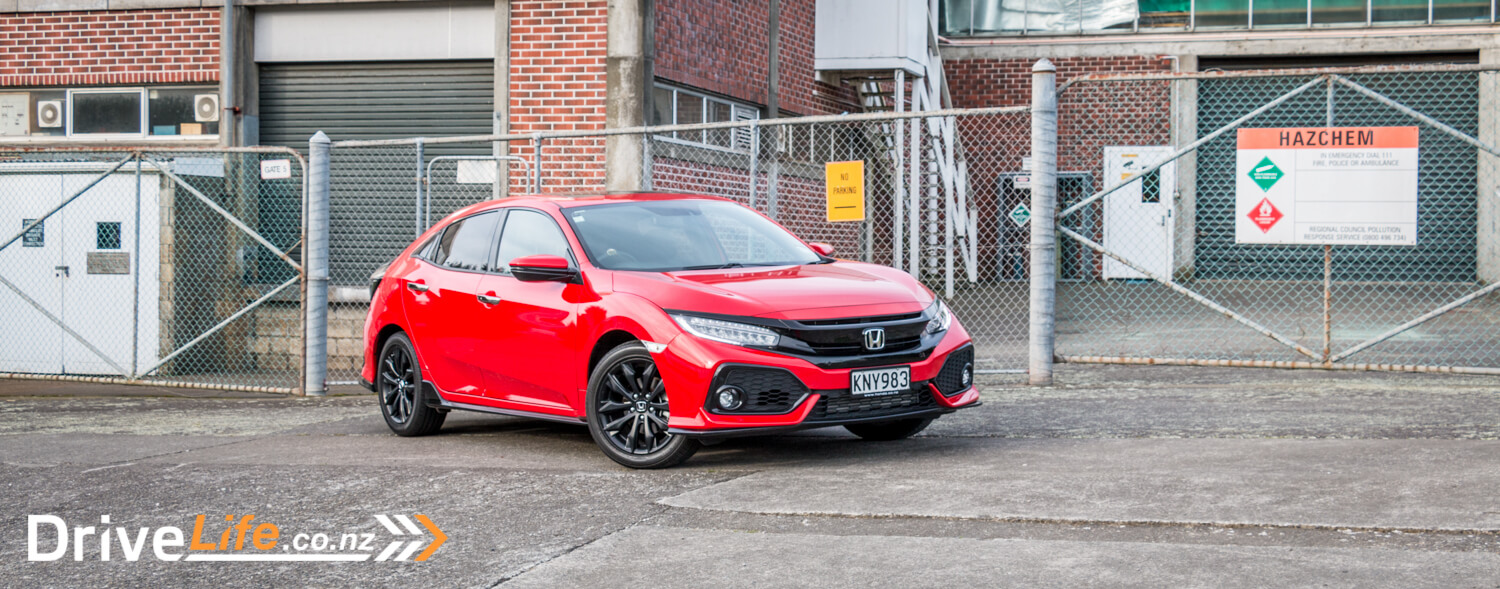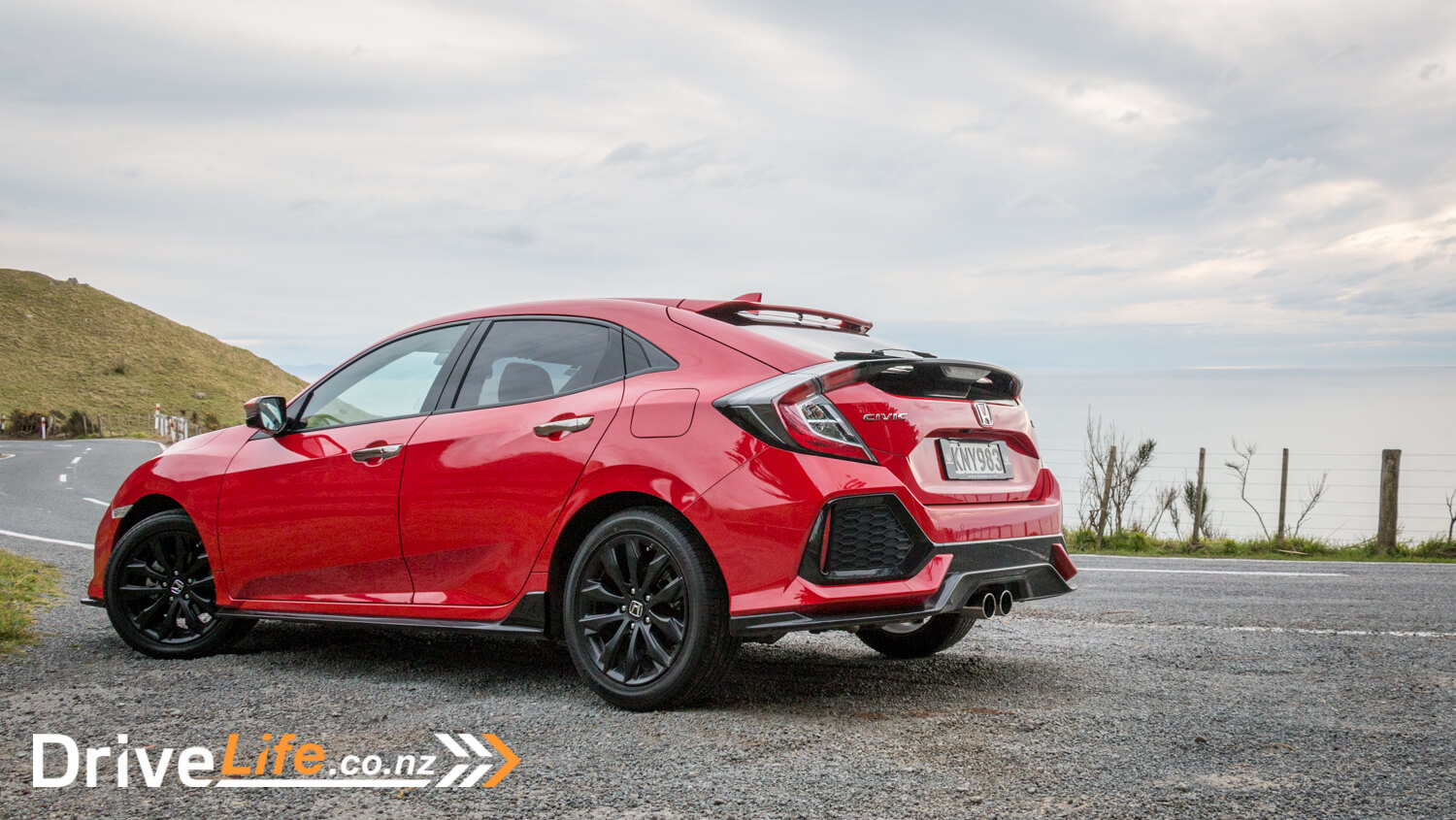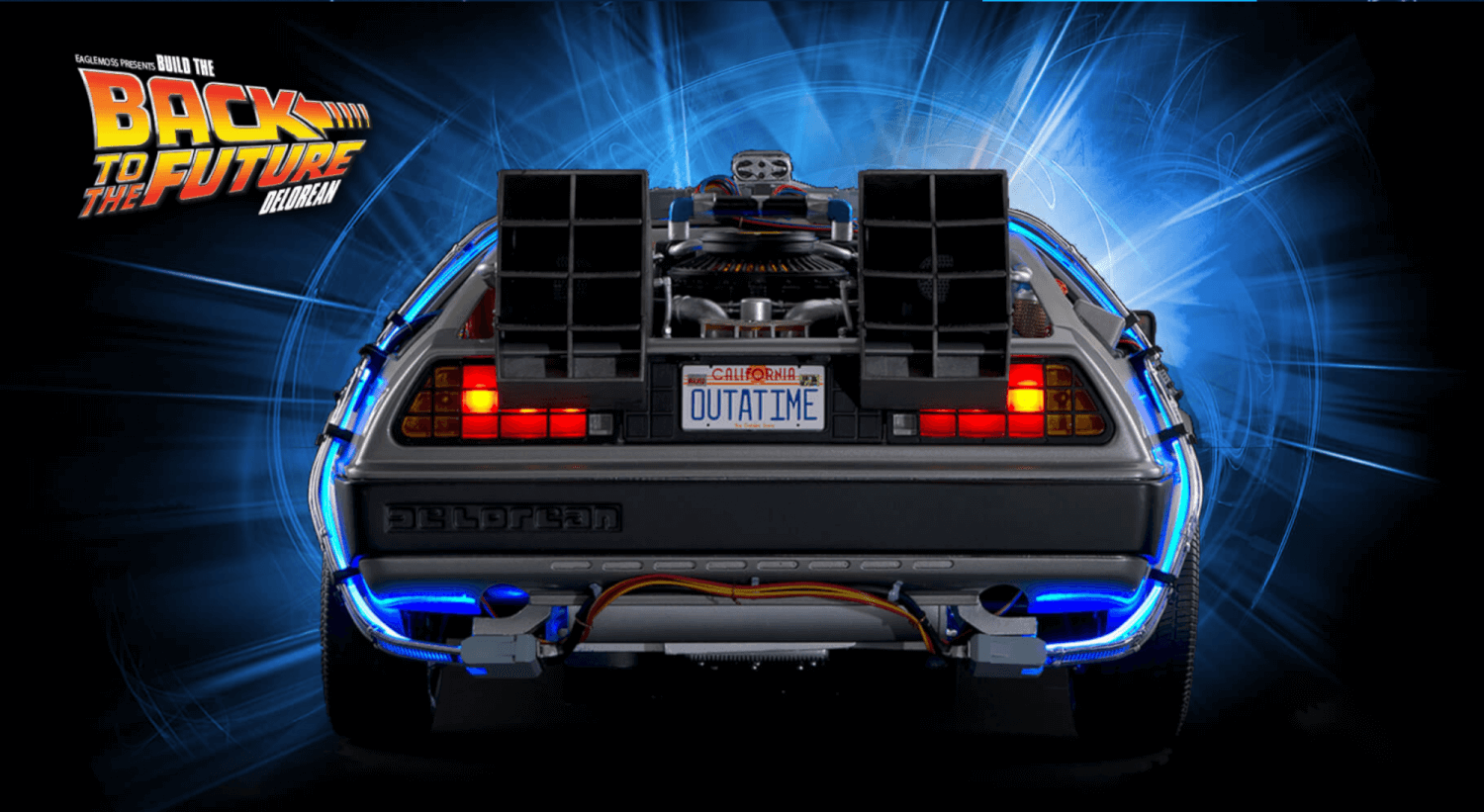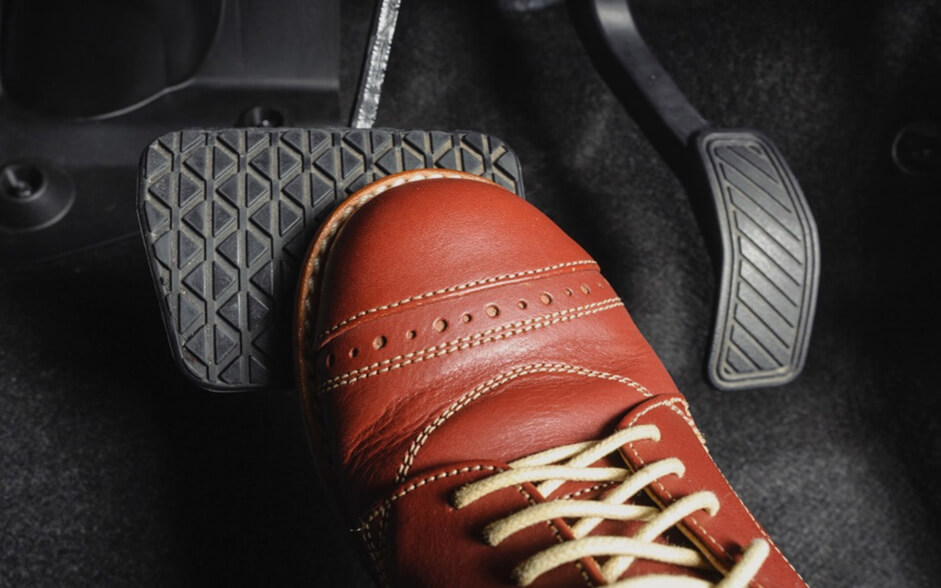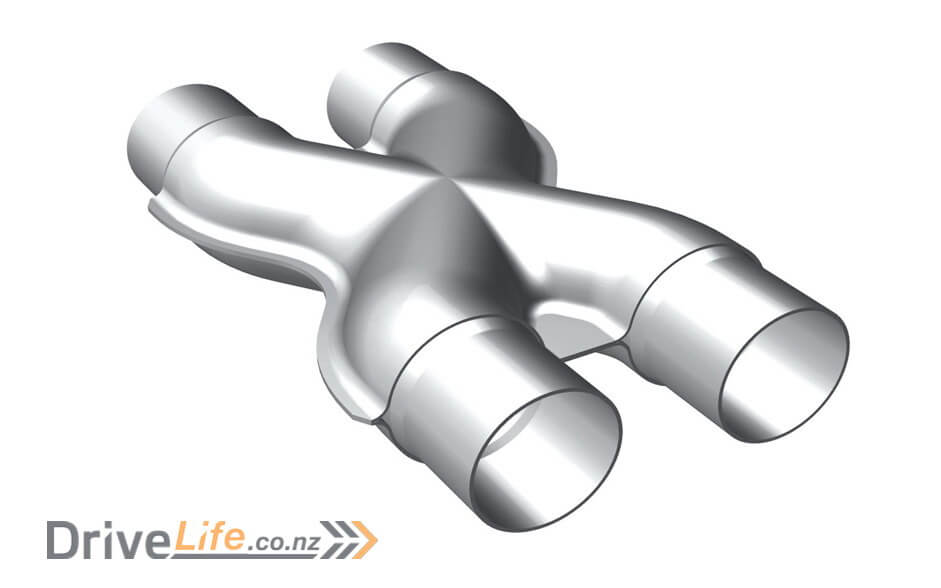I tested the sedan version of the tenth generation Honda Civic almost a year ago, and I remember being pretty impressed. Alongside the release of the Type-R, which is only available as a hatchback, Honda have also brought out an everyday version of the hatch.
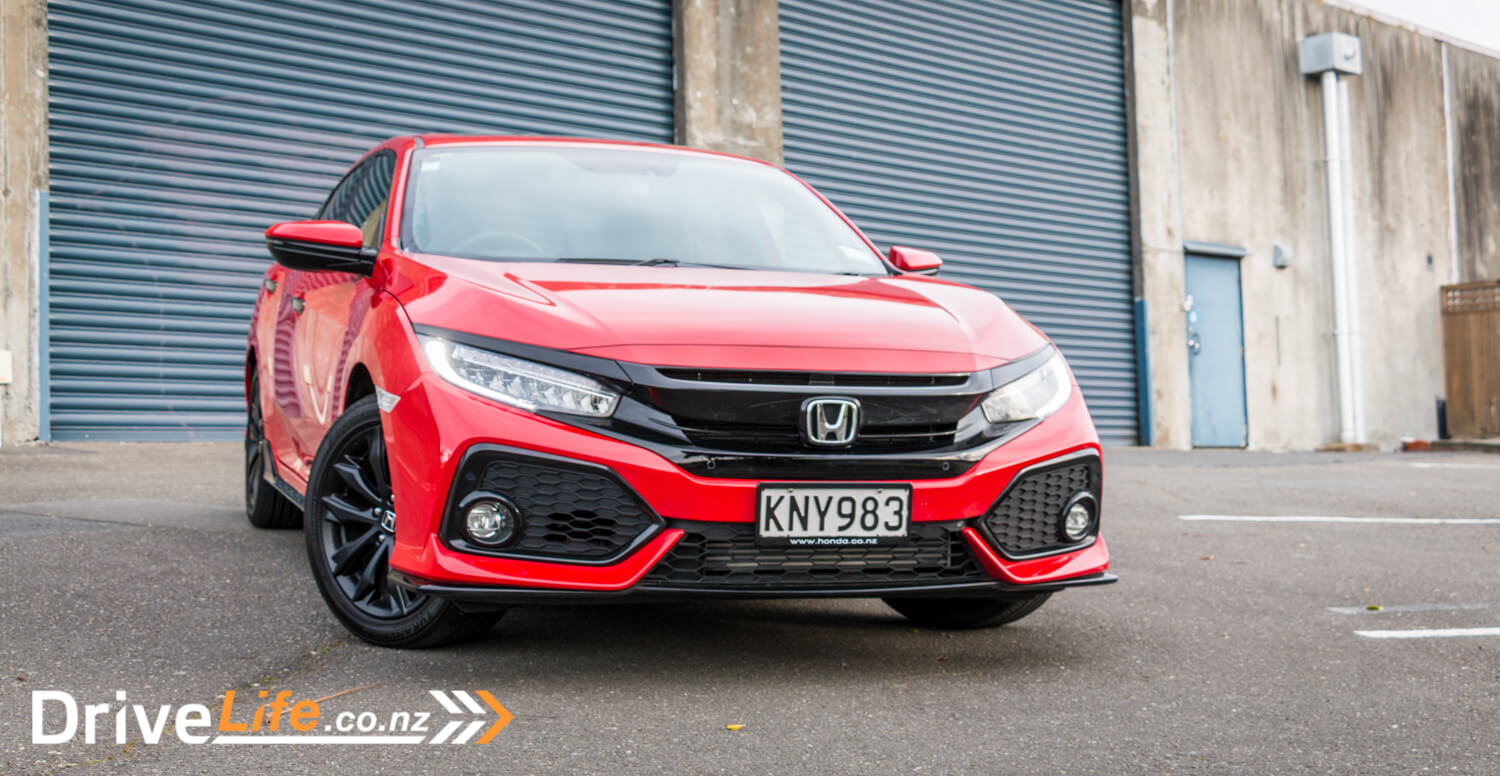
The Range
The whole range has the same CVT transmission, and includes ABS, electronic brakeforce distribution, emergency brake assist, motion adaptive electric steering, stability and traction control, agile handling assist, front, side and curtain airbags (6 in total), straight driving assist, reversing camera with parking sensors, climate control, cruise control, and a 7” touchscreen entertainment system.
What is straight driving assist, I hear you ask? When cruise control is active it detects whether the driver is making steering inputs to correct for a slope or camber and applies motor assist to reduce the muscle effort required. An interesting feature which should reduce driver fatigue on long trips.
Prices start at $32,900 for the SX hatch and rise to $35,300 for the SXL, and $36,500 for the SX Sport -all with the 104kW/174Nm 1.8l normally aspirated engine.
Topping the range, the RS Sport has the 1.5l VTEC turbo engine producing 127kW and 220Nm. It adds paddle shifters, 17” wheels, lanewatch camera, rear privacy glass, rain sensing wipers, auto headlights, power folding mirrors, proximity key with walk-away door locking, and push-button start. Our test car was the top spec RS Sport Turbo, priced at $40,900, which includes sports leather trim, electrically adjusted driver’s seat, Piano Black trims and 12 speaker 452w premium audio system with subwoofer.
It’s available in seven colours, including white, a couple of silvers, black, the Rallye Red seen here, and the excellent Brilliant Sporty Blue.
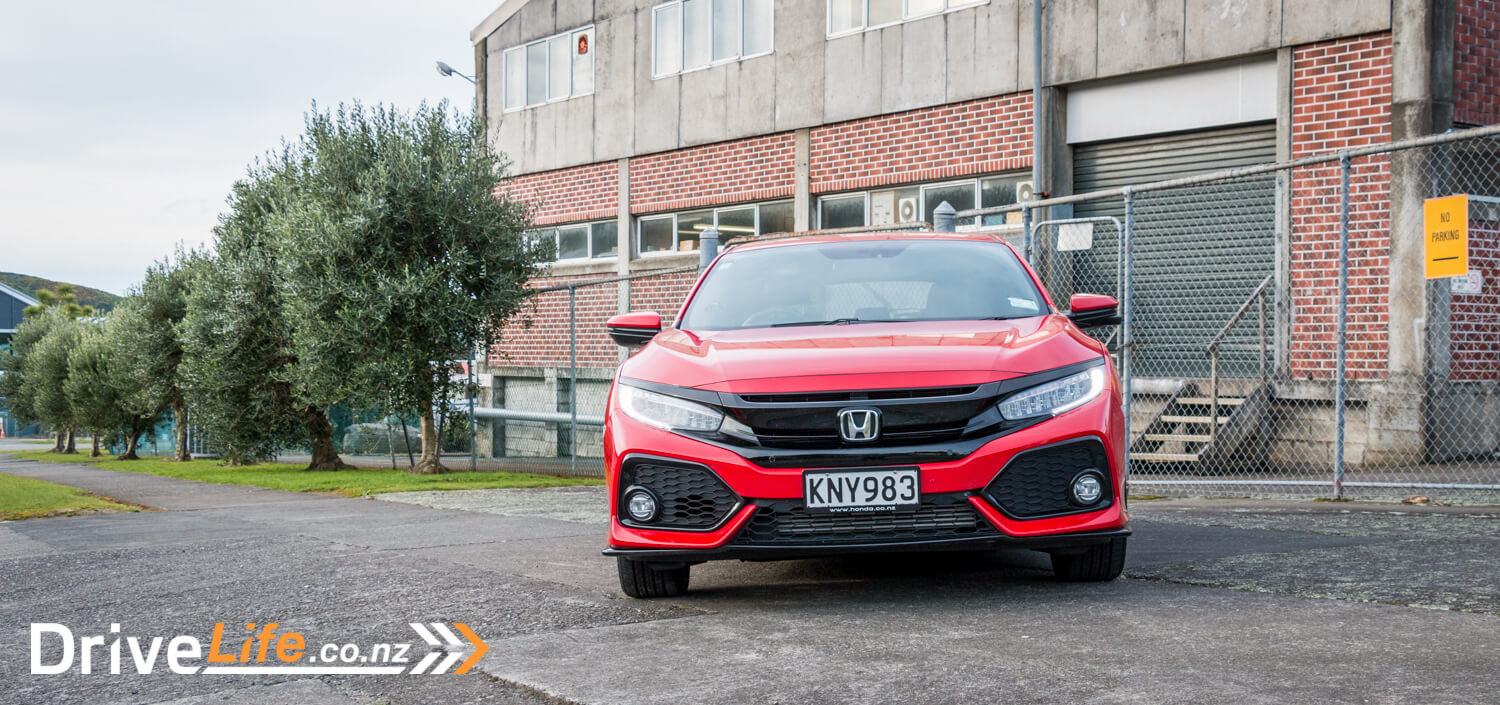
First Impressions
The Civic hatch has new bumpers front and rear, a new central twin-exhaust design, and gloss black side mouldings and details. I really like the way it looks, but it definitely polarises opinions. It got a fair bit of attention, and the reactions were either “That looks great” or “I hate your boy-racer car”. You can see where styling cues have been taken from the functional aero pieces on the Type-R and toned down to cosmetic pieces for the hatch. So the looks are somewhat Marmite, but for me, it looks great.
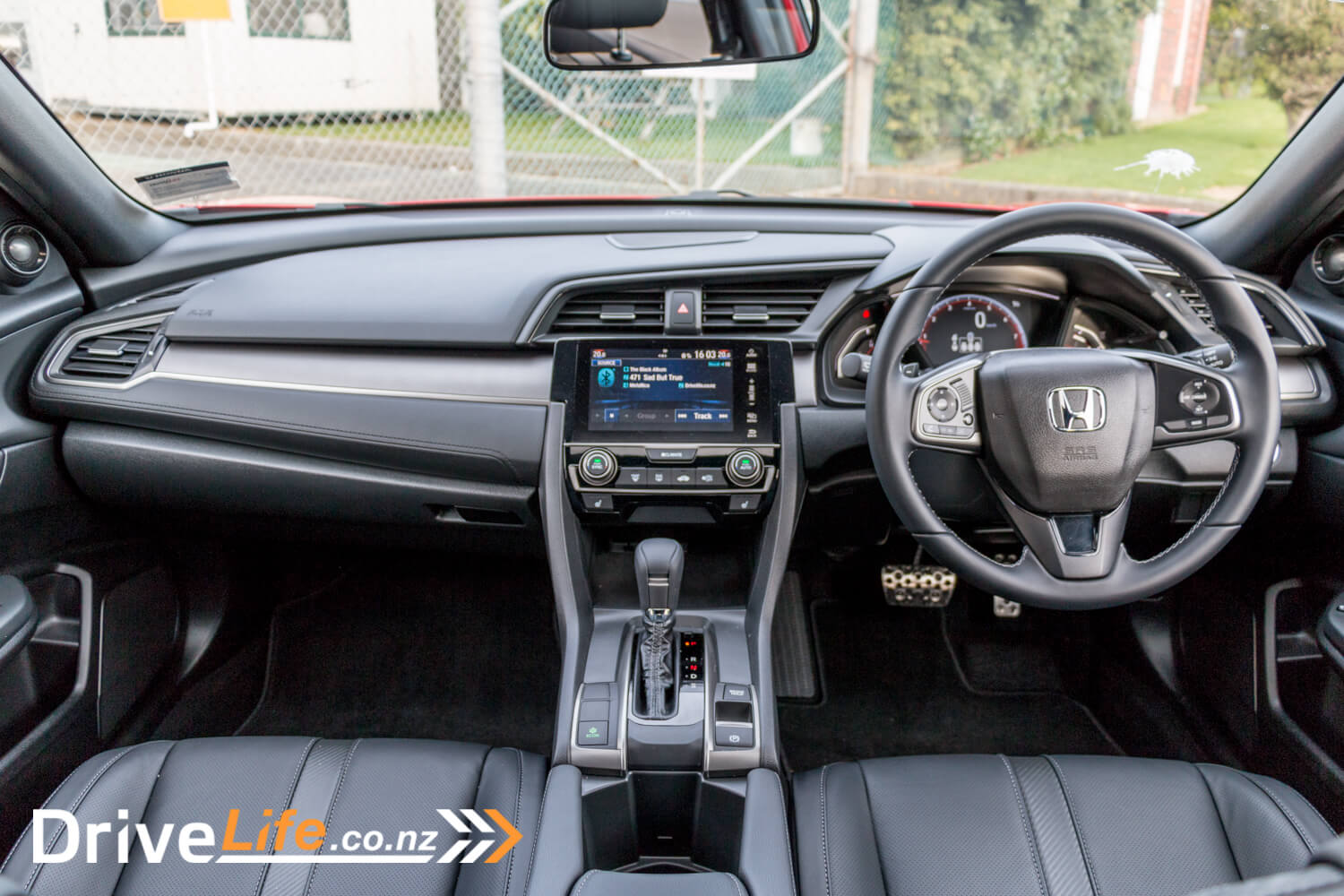
The Inside
The inside is very much the same as the sedan, and that’s a good thing because it looks and feels great. The seats are comfortable and supportive, with electric adjustment on the driver’s side, manual on the passenger. They’re also three-stage heated. The steering wheel adjusts both up/down and in/out, but the lever is a bit hard to find, being way down under the steering column.
The instruments are pretty cool. The section in front of the driver is split into three displays – two LED bars to the sides, for temperature and fuel level, and a large central colour LCD display for everything else. I really like it, it’s simple, readable and configurable how you want it.
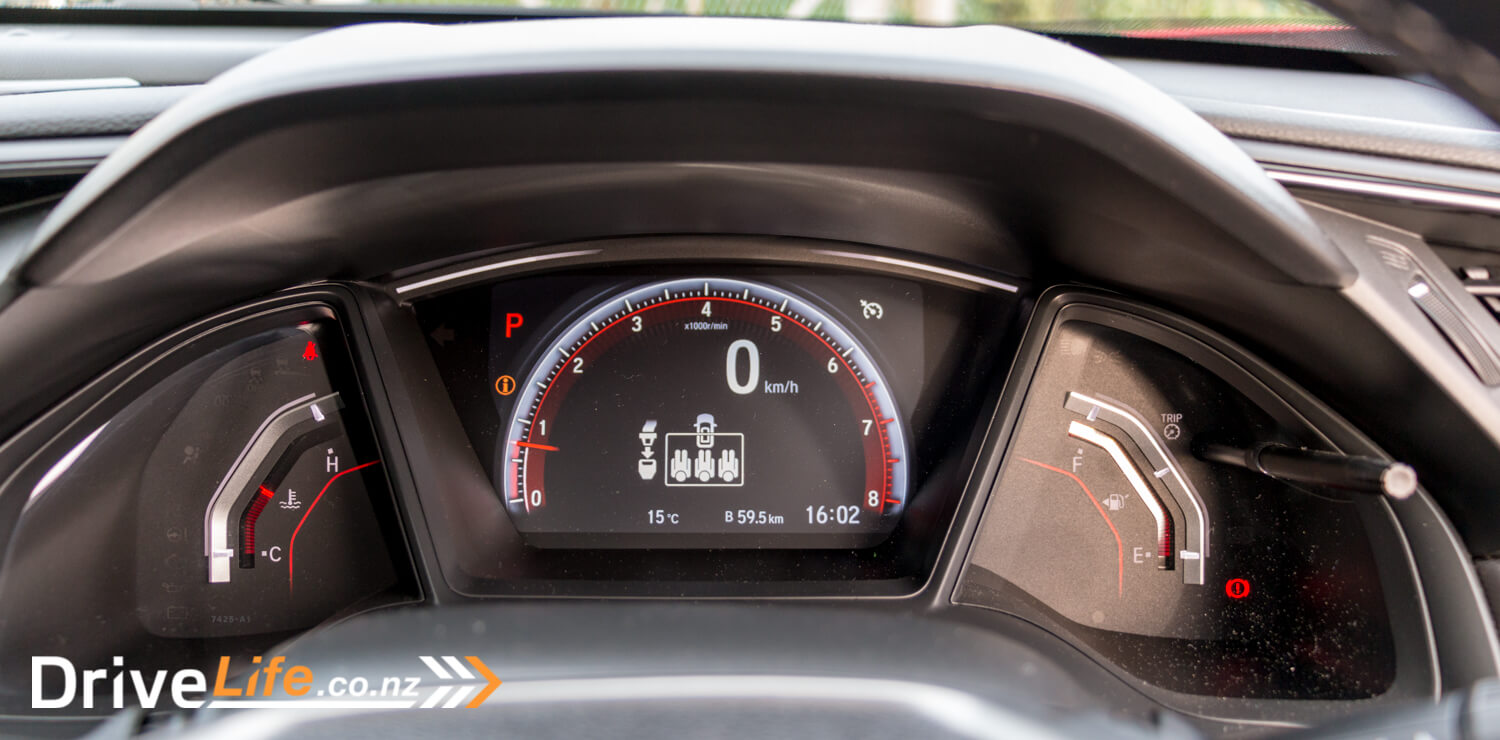
There’s a 7 inch touch-screen media system in the centre of the dash, which also is used to control some of the functions of the climate control. There are knobs for the dual-zone temperatures, and buttons for demisters, but if you want to change the fan speed or what vents the air comes from, hit the climate button and use the screen to set it up. It actually works really well and is simple to use.
The stereo has Bluetooth connectivity as well as Android Auto and Apple CarPlay. There’s a double level central console with the power and USB sockets hidden out of sight, but wires can be fed through to a cubby at the top. There are even little clips to stop the wires falling back down. In the central armrest cubby is a second USB socket but only the front one connects to the stereo, the rear one is just for charging. My phone connected without any hassles, and unlike a few cars I’ve tested recently it re-connected and switched to Bluetooth every time I started the car. The sound quality is excellent, clear with really deep bass from the subwoofer, and it goes nice and loud without any distortion.
The rear seats are as comfortable as the fronts, and legroom is very impressive. I had loads of room behind the driver’s seat with it on my normal position. The boot is a pretty big at 414 litres with the seats up. Smaller than the sedan but the rear seats split 60/40 and drop flat for longer items, giving you 1203 litres of space.

The Drive
The Civic has keyless entry and start. Sitting in the driver’s seat causes the start/stop button to pulse with a soft white glow. “Press me!” It softly demands. When you do, the button turns red and the display fires up with a welcome animation, drawing the rev counter like a rainbow, then the lines fly up from the bottom. It’s both cheesy and cool.
As with most newer cars the central display has a message to agree to, to say you’ll use it responsibly. If you don’t press it, the display shows a pattern of stars, nothing else, until you give in and press it. As well as the reversing camera, which has three angles of view, in the passenger side mirror there’s a second camera pointing backwards. Honda call it a Lanewatch camera. When indicating left, its view is displayed on the main screen, showing a great view of the blind spot on that side. It can be turned on by pressing the end of one of the stalks if needed.
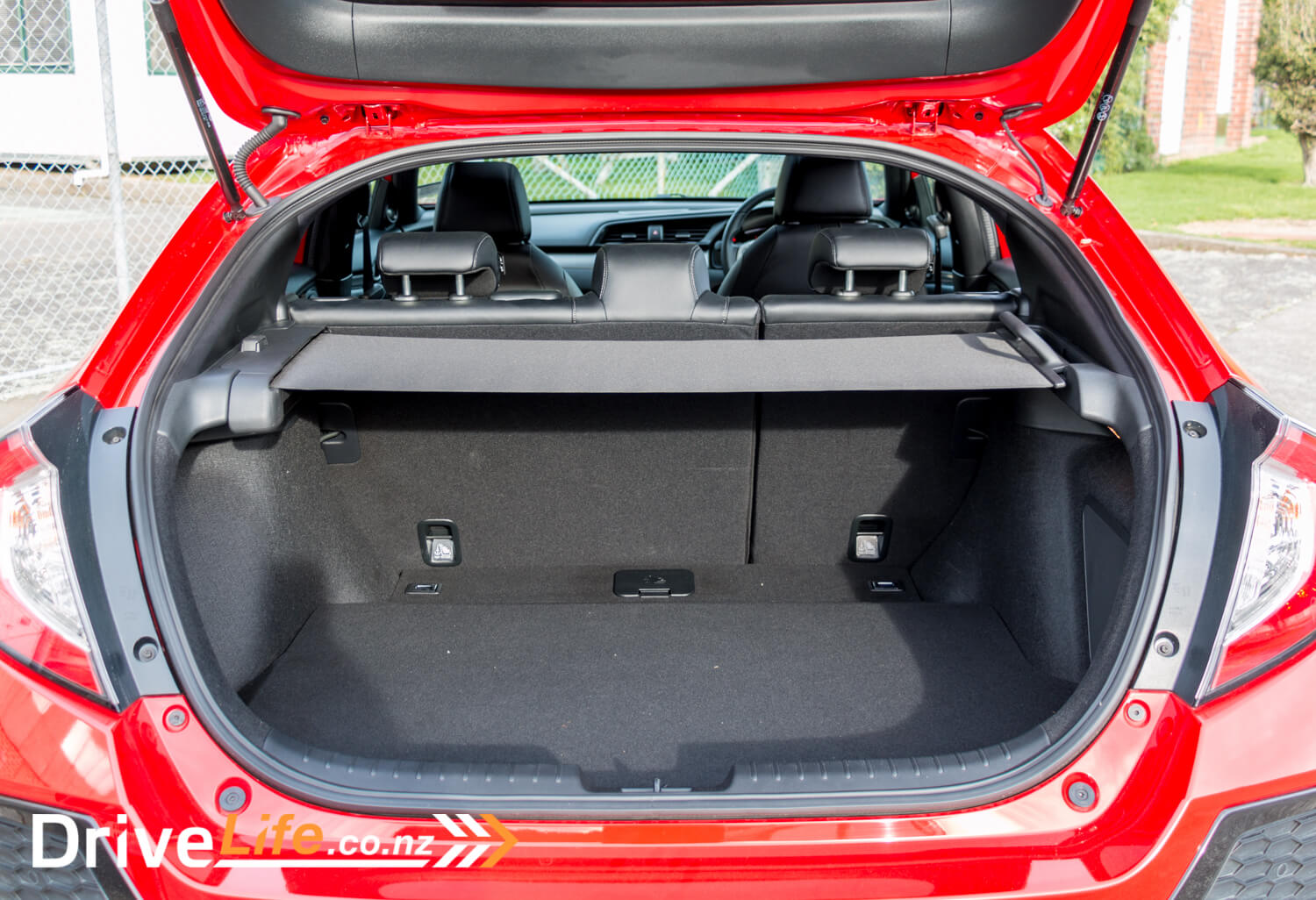
On to the drive. I was expecting this to be a very familiar experience, having driven the sedan last year. And to some extent it was. It still had all of the things I liked about the Civic before – excellent refinement, with very minimal road noise in the cabin, comfortable seats, logical controls. But as I drove it more, I came to realise that it’s not just the Civic sedan with a different rear end. Honda have done some work on the car and have definitely made some improvements.
The CVT is better tuned than before and most of the time I didn’t notice what it was doing at all. This is a real compliment, as often with a CVT it’s something that starts to niggle at me with more driving. Sure they’re an efficient and logical way of making a transmission but they have characteristics that can annoy the enthusiast driver. And with the looks of this car and the RS badging, they’re definitely aiming it at people who like to drive. When accelerating hard it still has some of that CVT constant “aaaaaa” engine note, and playing with the shifter paddles behind the wheel doesn’t seem to change things all that much. But leave the paddles alone and just drive, and the Civic hatch’s CVT does a very good job.
The other thing that became obvious after a bit more driving is the handling. The Sedan felt like more of a cruiser, with a great ride but excellent handling when pushed a bit harder. The hatch takes this up a notch and feels even sharper and more direct in corners. General comfort and smoothness in normal use doesn’t seem to have been affected. Well done, Honda!
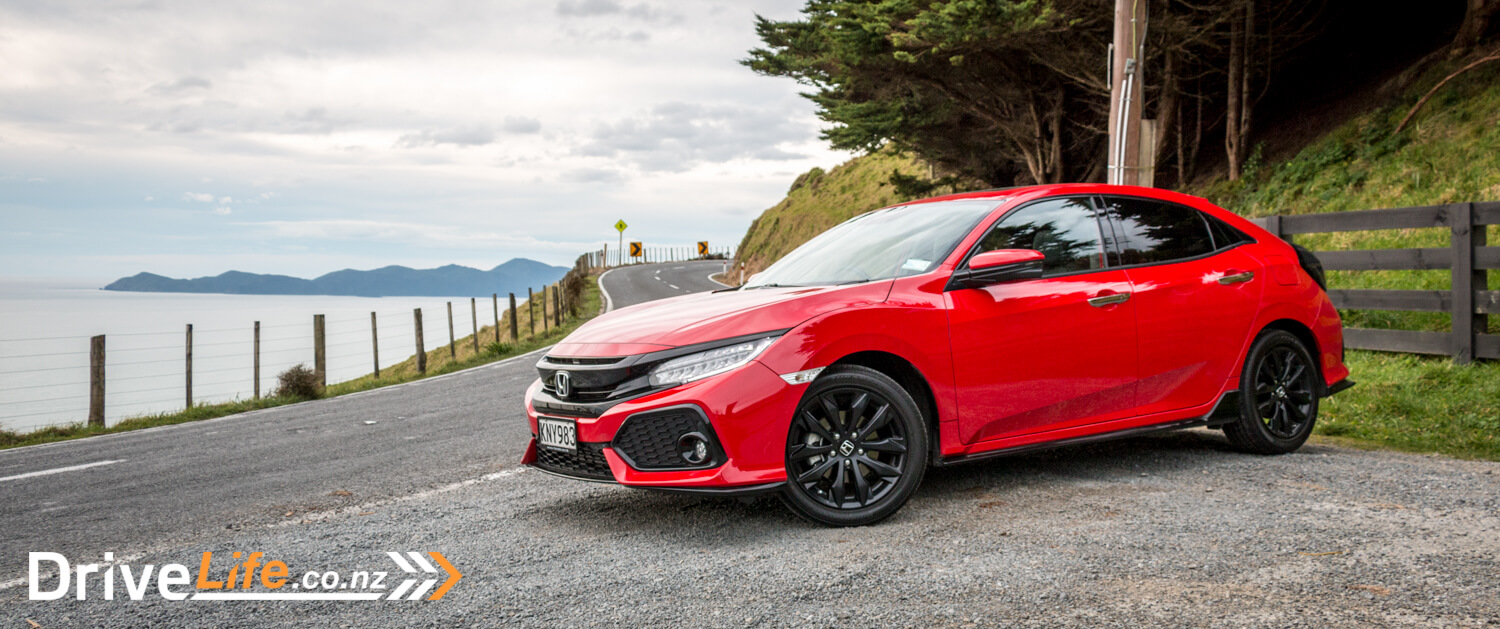
They have changed some settings as well as adding a new type of suspension bushings. There’s also Honda’s Agile Handling Assist, which uses brake torque vectoring to brake the inside wheel and pull the car around corners. This system isn’t really noticeable as any kind of electronic interference in your driving but it certainly seems to tighten things up.
It’s definitely a satisfying car to pilot around the twisty roads, but there is a bit of a numbness to it as well. It doesn’t have the same sort of feel and feedback as, say, a small sports car. But this is a sporty medium hatch, not a Type-R and I think Honda have found a good balance.
Over the time I had the Civic, I did a reasonable combination of town and highway driving, and averaged 8.1l/100km. This is a fair bit away from the 6.0l/100km quoted figure. A few more motorway drives would certainly have brought it down more as most of my trips were relatively short.
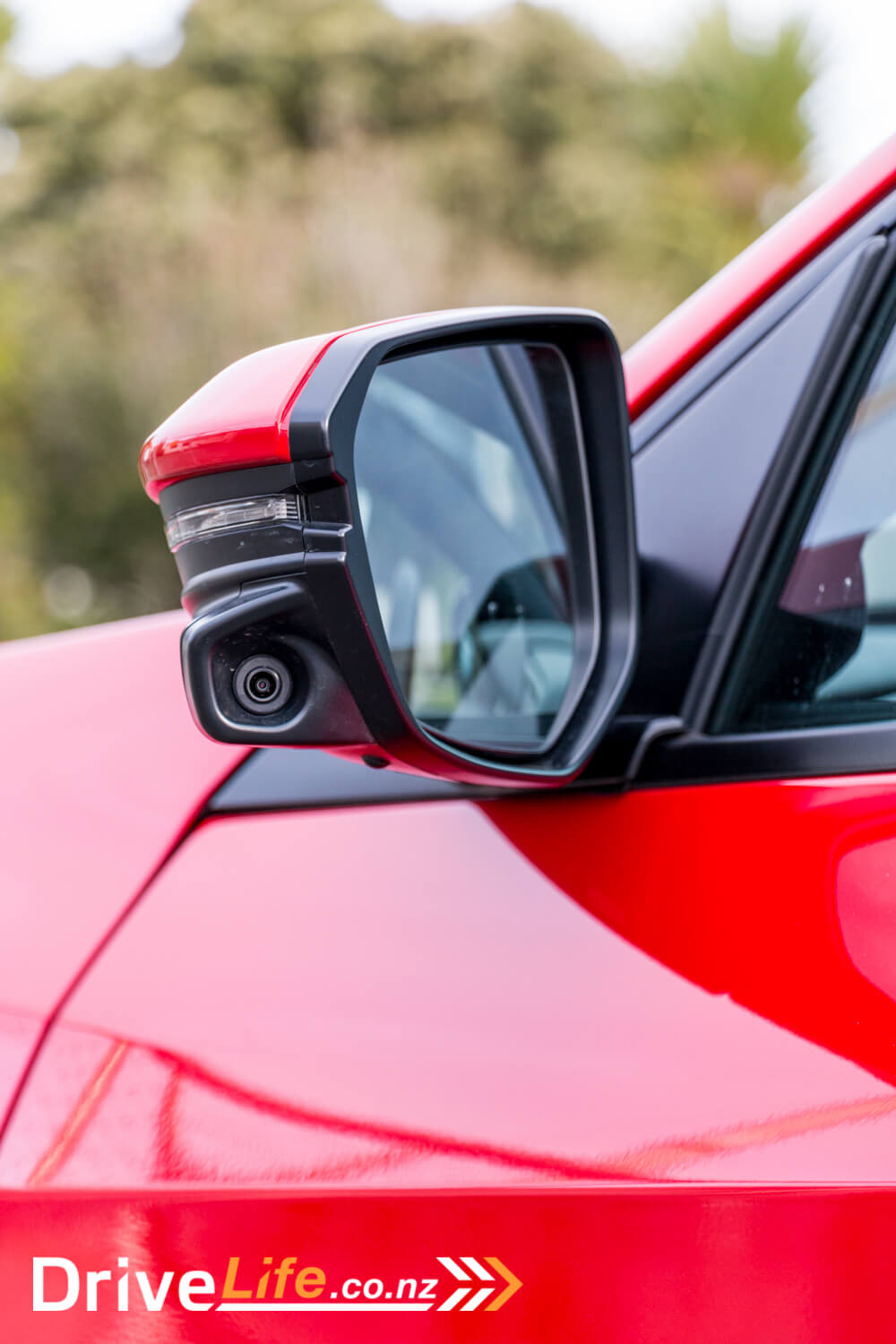
The Competition
| Brand / Model | Engine | Power | Fuel L/100km | 0-100km/h | Price Highest to Lowest |
| BMW 118i | 1.5l 3 cylinder turbo | 100kW/220Nm | 4.8 | 8.7s | $47,200 |
| Hyundai Accent Turbo | 1.6l 4 cylinder turbo | 150kW/265Nm | 7.5 | N/A | $43,990 |
| VW Golf TSI R-Line | 1.4l 4 cylinder turbo | 110kW/250Nm | 5.2 | 8.2s | $43,390 |
| Renault Clio RS Sport 200 | 1.6l 4 cylinder turbo | 147kW/240Nm | 6.3 | 6.7s | $42,990 |
| DS DS3 | 1.2l 3 cylinder turbo | 81kW/205Nm | 4.7 | 9.9 | $42,990 |
| Toyota Corolla Levin ZR | 1.8l 4 cylinder | 103kW/173Nm | 6.1 | 10s | $41,990 |
| Honda Civic RS Sport Hatch | 1.5l 4 cylinder turbo | 127kW/220Nm | 6.0 | N/A | $40,900 |
| Kia Cerato LTD | 2.0l 4 cylinder | 112kW/192Nm | 7.1 | N/A | $39,990 |
| Alfa Romeo Giulietta | 1.4l 4 cylinder turbo | 125kW/250Nm | 5.1 | 7.1s | $39.990 |
| Mazda Mazda3 SP25 | 2.5l 4 cylinder | 138kW/250Nm | 6.1 | N/A | $39,895 |
| Holden Astra RS-V | 1.6l 4 cylinder turbo | 147kW/280Nm | 6.3 | N/A | $38,490 |
| Ford Focus Sport | 1.5l 4 cylinder turbo | 132kW/240Nm | 6.7 | N/A | $38,340 |
| Peugeot 308 Allure | 1.6l 4 cylinder turbo | 110kW/240Nm | 6.5 | 8.5s | $37,990 |
| Hyundai Accent Elite | 1.6l 4 cylinder | 103kW/167Nm | 6.6 | N/A | $35,990 |
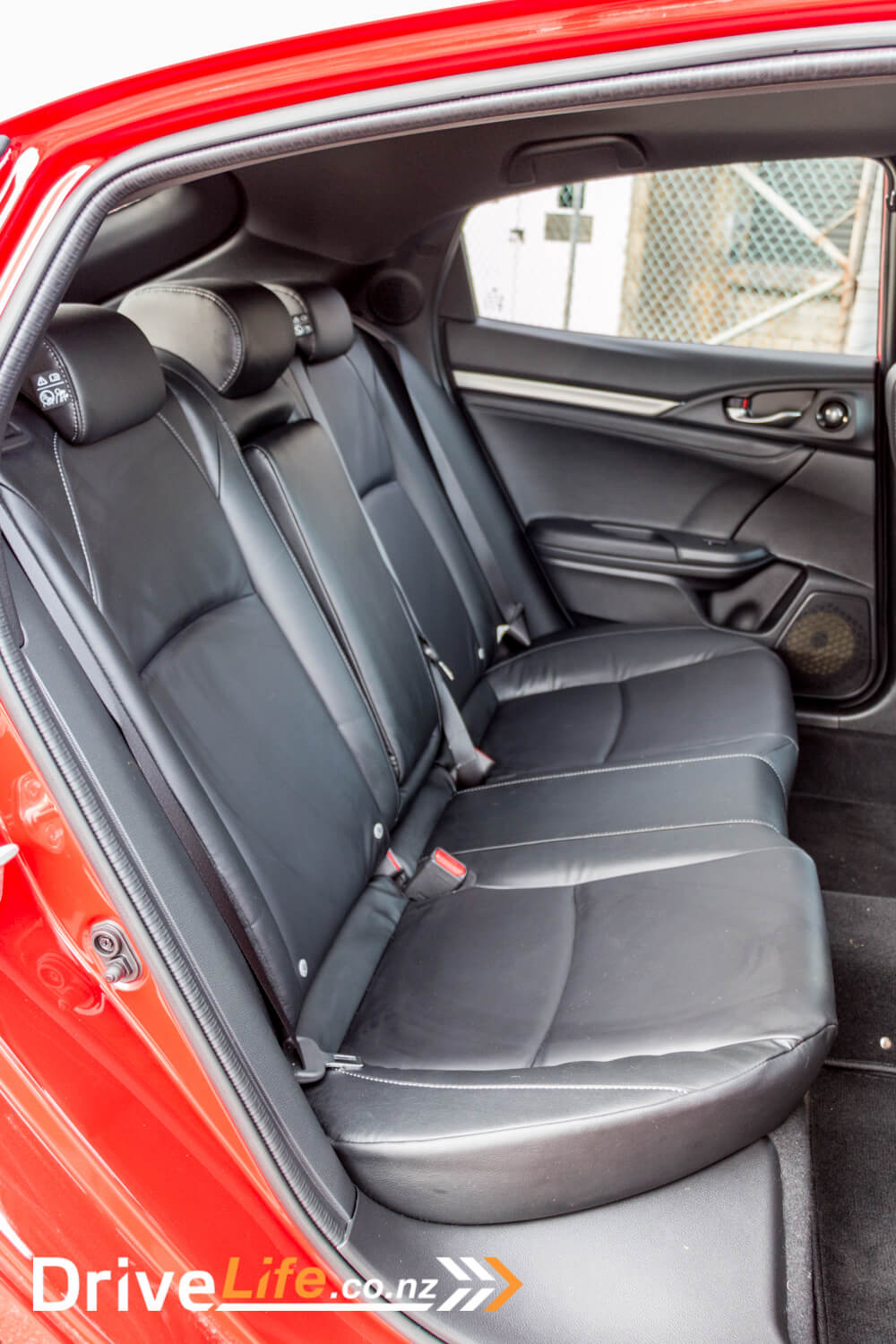
The pros and cons
| Pros | Cons |
|
|

What we think
I’m impressed that Honda have taken the time to make improvements to the Civic Hatch rather than just sticking a different body shape on the sedan platform. It’s a well-designed, well-built, great-handling car with an excellent stereo and very good interior space. It’s good value for money.
With a five year warranty and 1.7% finance currently available it’s a car you should definitely try out if you’re looking for a sporty hatchback.
Rating – Chevron rating 4.0 out of 5

| Vehicle Type | Medium hatchback |
| Starting Price | $32,900 + on-road costs |
| Tested Price | $40,900 + on-road costs |
| Engine | 1.5l 4 cylinder 16 valve VTEC turbo intercooled chain drive DOHC with EarthDreams direct injection technology |
| Transmission | Automatic CVT with G Design Shift |
| 0 – 100 kph | Not quoted |
| Kerb Weight | 1344 kg |
| Length x Width x Height | 4515 x 1799 x 1421mm |
| Cargo Capacity | 414 Litres seats up
1203 Litres seats folded |
| Fuel Tank | 47 litres |
| Fuel Efficiency | Advertised Spec – Combined – 6.0L / 100km
Real World Test – Combined – 8.1L / 100km |
| ANCAP Safety Ratings | 5 stars |
| Warranty | 5 year unlimited kilometre warranty
5 year 24 hour roadside assist |
